As the Planet Spins, It’s Not Just the Climate That’s Changing
May 21, 2024
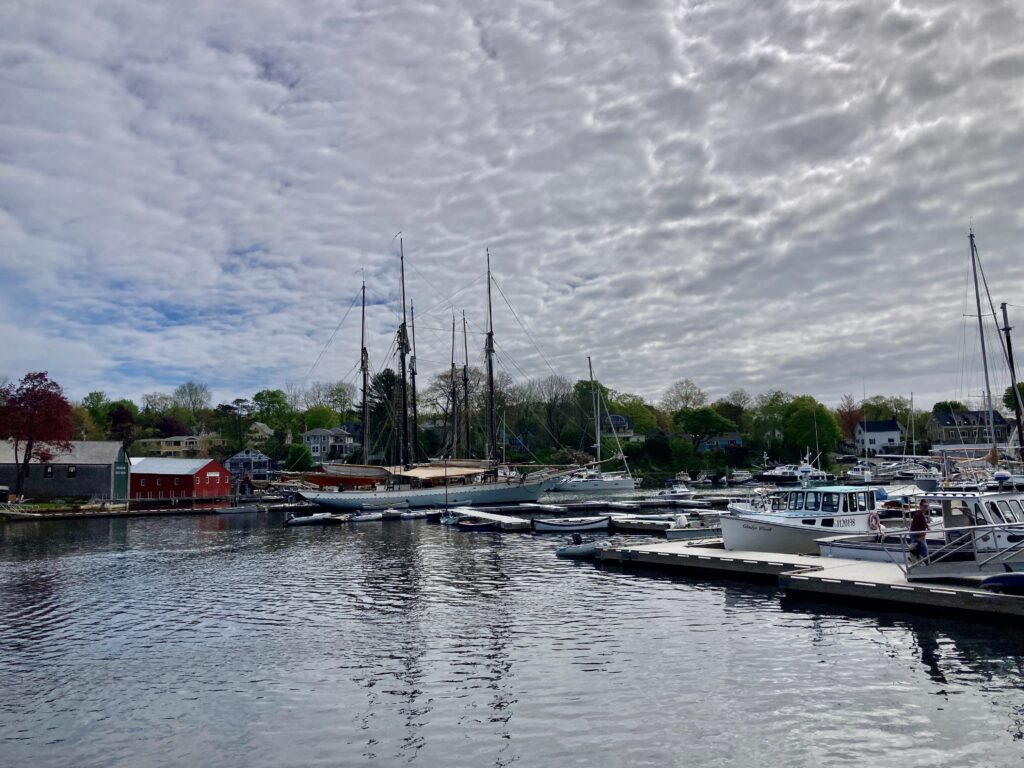
By the time you read this our air temperatures are due to rise to their warmest yet this spring—mid-70s, sunshine. Perfect, classic Camden weather. Yes, ahead of “schedule,” and short-lived, as we’re due to return to average temperatures next week.
We’ve noticed that along with the warming of the soil, the air, and the harbor temps, life in our community feels more heated. Some of it’s linked to the frenzy of getting in gardens, the end of school, heightened social calendars, chore lists growing like weeds.
And some of it, we sense, has to do with a wider net of the world. In his poignant book, The Weight of Nature: How a Changing Climate Changes Our Brains, Clayton Alder explores the psychological impact of living in a time and world where the climate system—its very nature—is undergoing a profound shift. The neural networks in our brains change. And changed brains lead to changed behavior.
Author Alder noted a 2015 Dept. of Defense report framing how the changing climate
acts on our security. . . climate change isn’t about rising temperatures and sea-level rise. Those concerns were secondary to something more human: the global climate’s ability to ‘aggravate existing problems’ like poverty, social tensions, ineffective leadership, and weak political institutions. It wasn’t just that a warmer world would hurt us outright; it was that a warmer world would make us hurt one another.
Can you feel the heat, too?
As we’ve noted since we started this newsletter, climate change beckons for social resilience, which grows when communities come together to find common ground and shared values.
We’re hoping that both Camden and Rockport—each navigating divisive June elections with issues that will be with us for years—also sow the seeds of generosity of spirit and respect for differing opinions. We’ll need each other as the temperatures and seas rise.
Recent Climate Notable Events and Recordings
Among the frenzied activities of this season are several community meetings of note. We’ve described them here and included links so you can hear for yourself.
- Harbor Committee of 5/14/24 event with Island Institute on Electrifying Our Waterfront. Breeze ahead to at least one hour into the meeting to hear the presentation.
- Camden Select Board Candidates’ Forum of 5/14/24—lots of talk about the climate crisis. Let’s hope more climate policy—reducing town’s emissions (solar), helping roll out weatherization initiatives, and pushes for EVs and ebikes—follows.
- Listen to Blake Sanborn’s Camden Talks Climate presentation (May 16, 2024), “Resilient Waterfront Design Transformations: How Landscape Architects are Reshaping Resilience with Coastal Communities.” Sanborn had some terrific insights into the processes a town like Camden can use to best achieve harbor resilience.
- Trees help reduce dangerous greenhouse gases in our atmosphere—they’re critical in the fight against global warming. We’re thankful the Camden Conservation Commission presented Beech Leaf Disease (early May 2024). This disease is caused by a nematode—you can’t miss its ravaging impact hiking in the state park. This is an excellent summary of the disease and Maine’s current research and response.
- As we’ve said before, climate change is exacerbating the issues with our wastewater treatment plant. Listen to this Rockport Select Board Meeting of 5/13/24 with discussion of wastewater and EMS issues, and collaboration with Camden. Who’s going to lead the charge to work together?
- Reuse Revolution by Daniel Salomon to the Historic Resources Committee, 5/14/24. Listen about 1 hour 20 minutes in to hear his talk. (Re:Purpose Savanah and the deconstruction ordinance in Portland, Oregon.)
Upcoming Climate Events
May 23, Thursday, 4:30-6 pm, “100 Climate Solutions for Everyone,” by Heidi Roop, sponsored by Brooklin (ME) Climate Response, in person and via zoom. Subscribe to their newsletter, too. (Roop is the author of The Climate Action Handbook.)
May 31, Friday, 12:30-4 pm SEA Fair, Camden-Rockport Middle School. Over 30 nonprofits display their materials, including lots of nature-related activities for young and old. See more here.
June 5 (5 pm), Wednesday, and June 6 (1 pm), Thursday, and June 19 (5 pm) and 20 (1 pm), Camden Public Library, Camden Conversation Circles. Read more about these here.
June 13, Thursday, 6:30 pm, Camden Public Library, CamdenCAN Camden Talks Climate, “Planning Climate-Friendly Home Energy Upgrades,” with Annie Ropeik and Colin McCullough. Widespread fossil fuel heating use in one of the nation’s old housing stocks add up to a key climate challenge for Maine. Weatherization and electrification can help save money and make your home more comfortable, while shrinking your carbon footprint—but they don’t always come cheap, and they require careful planning. Learn from local climate journalist Annie Ropeik and energy auditor Colin McCullough of All-Around Home Performance in Gardiner about how they worked together to assess the needs of an 125-year-old home in Camden, and get up to speed on the benefits, possibilities, and resources for taking on these kinds of projects in your own space. Will be live, and on zoom.
Looking Forward for CamdenCAN Activities
Summer: Camden shines in the summer, and we hope each of you joins us in getting out as much as possible, in any of the ways that fill you with joy. We’ll maybe have an outdoor potluck, and our conversation circles will continue throughout the summer.
Fall: we’re hoping to have a food garden tour; we’ll make a push on municipal solar. And we’ll continue our Camden Talks Climate series with Kerry Emmanuel on hurricanes on 10/3. Other talks will be 10/17 and 11/14.
Upcoming and then ongoing: We’re partnering with the town of Camden to help with outreach on the Harbor Resilience planning project. The RFP is out now—early in June we expect the town to announce the contract award. The summer and fall months will be spent investigating the harbor and all the ways we can imagine to make it resilient for people—and nonhumans, too
2025: we’re hoping to work with the town on a weatherization project so Camden residents can get low-cost energy audits and help from local volunteer energy coaches. See the programs in Brooklin (scroll down to the Neighbor-to-Neighbor section) and York to whet your appetites. In New England, homes are the second-most contributor to greenhouse gases.
Other Climate Sites/Learnings Worth Checking Out
We’ve recently been learning about the state of EV charging in Knox County, courtesy of the fine folks working for the Midcoast Council of Governments. They invited Jon Gagne, who works for Maine Clean Communities, to a recent meeting, where we got inspired about EV chargers for Camden (tourists will want them!). Check out their site—you’ll find an EV Toolkit for Municipalities, and data on the numbers of EVs currently in Maine.
Gagne reported on the rollout for fast EV charging on Route One, which is now underway, and should possibly be finished by 2025. The fast charging station recently opened in Rockland is part of this initiative.
The Answer is Composting. Here Are the Questions—read this article from One Step This Week to get a terrific overview of the role of home composting in mitigating greenhouse gas emissions.
Jason Anthony writes a stellar newsletter, and this edition, while mostly about population growth, also pointed to the power of kelp and lawn rewilding.
Concluding Thoughts
Recent sea-level rise—and other climate changes—have undermined much. Literally. Walk along the public landing and Laite Beach and you’ll find spots just falling into the harbor. Water has its way, especially salt water.
Yes, some near-shore areas are getting repaired, as evidenced by the photos below. We’re thankful for the folks paying attention to the failing infrastructure and making repairs accordingly.
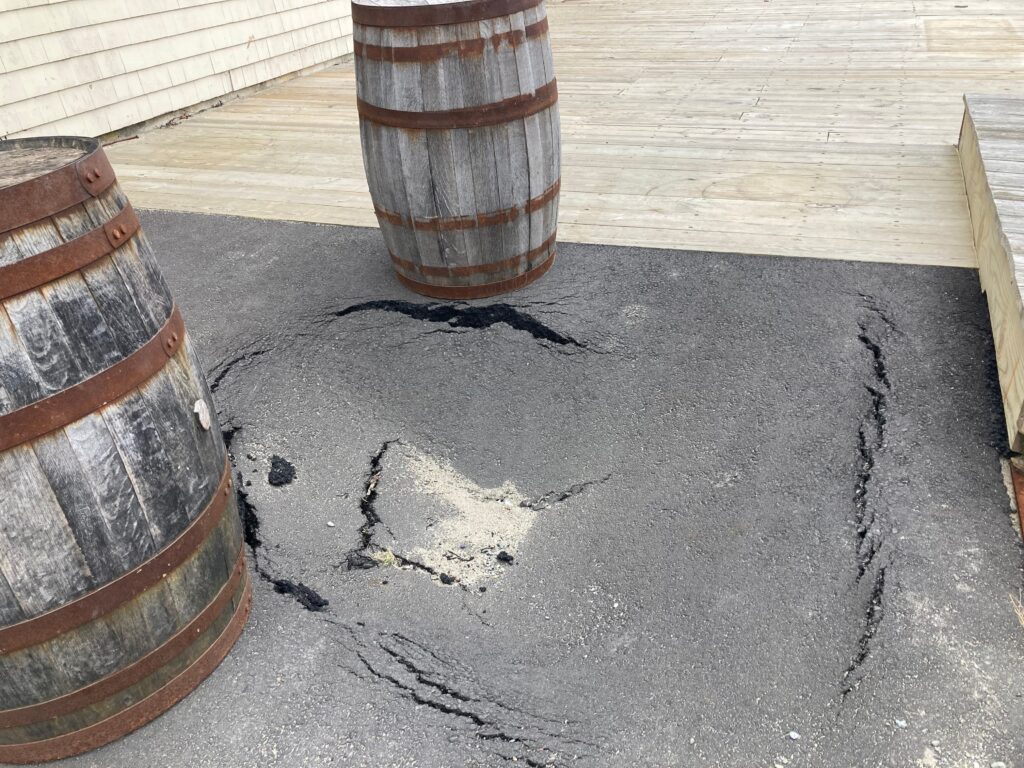
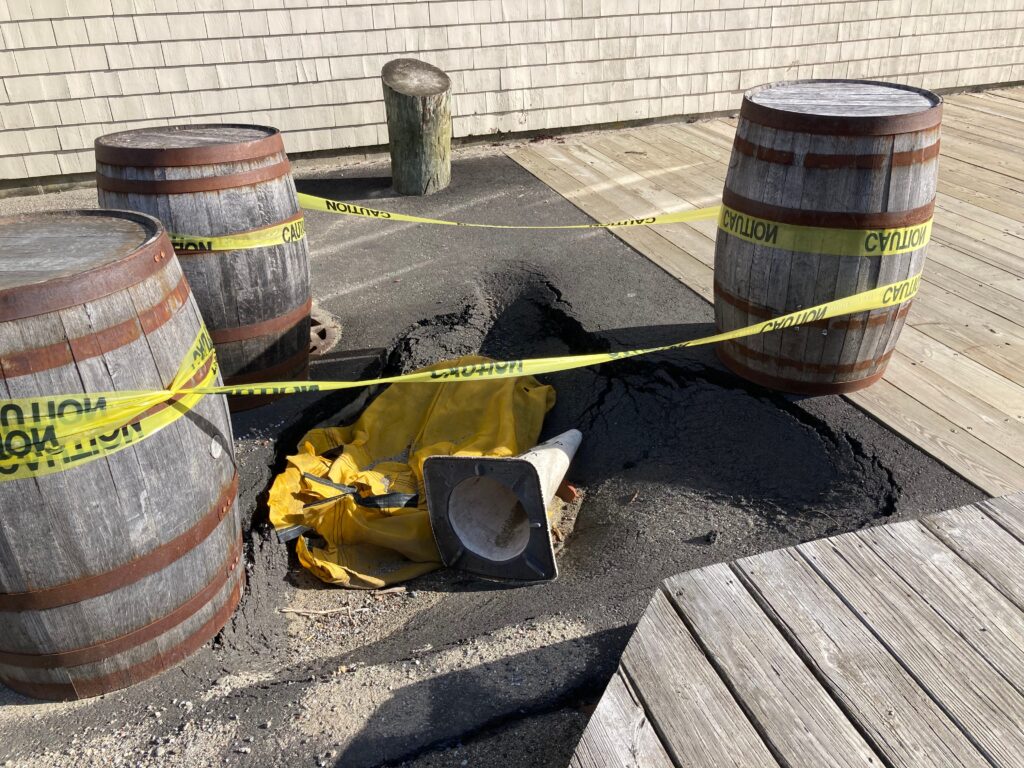
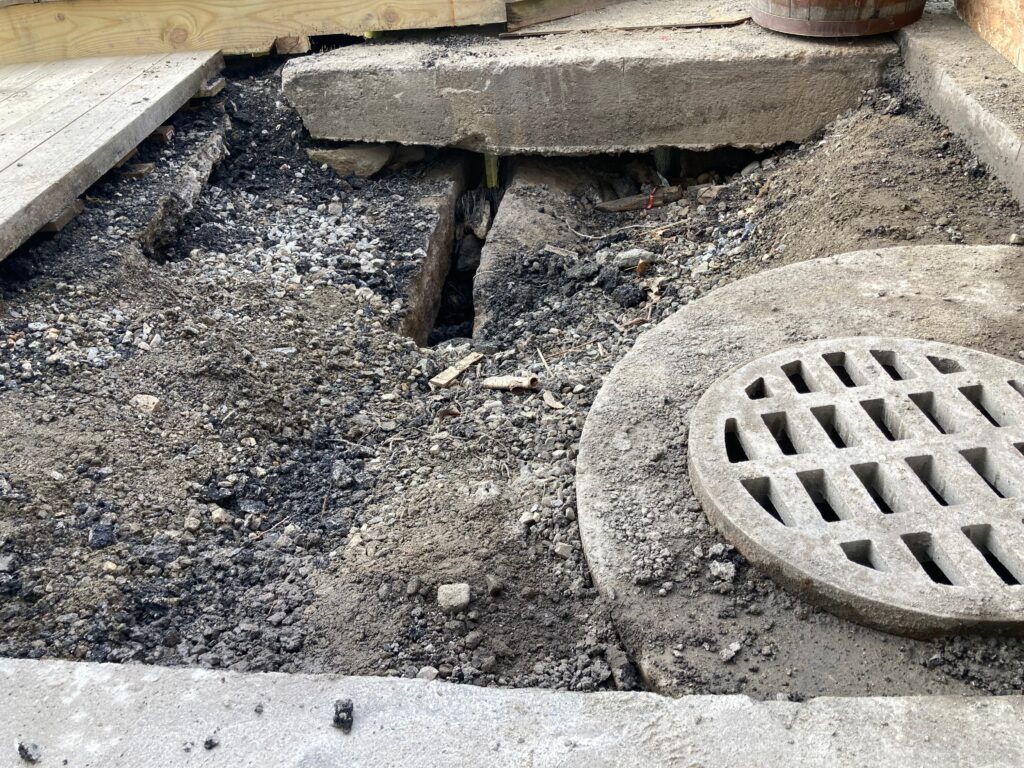
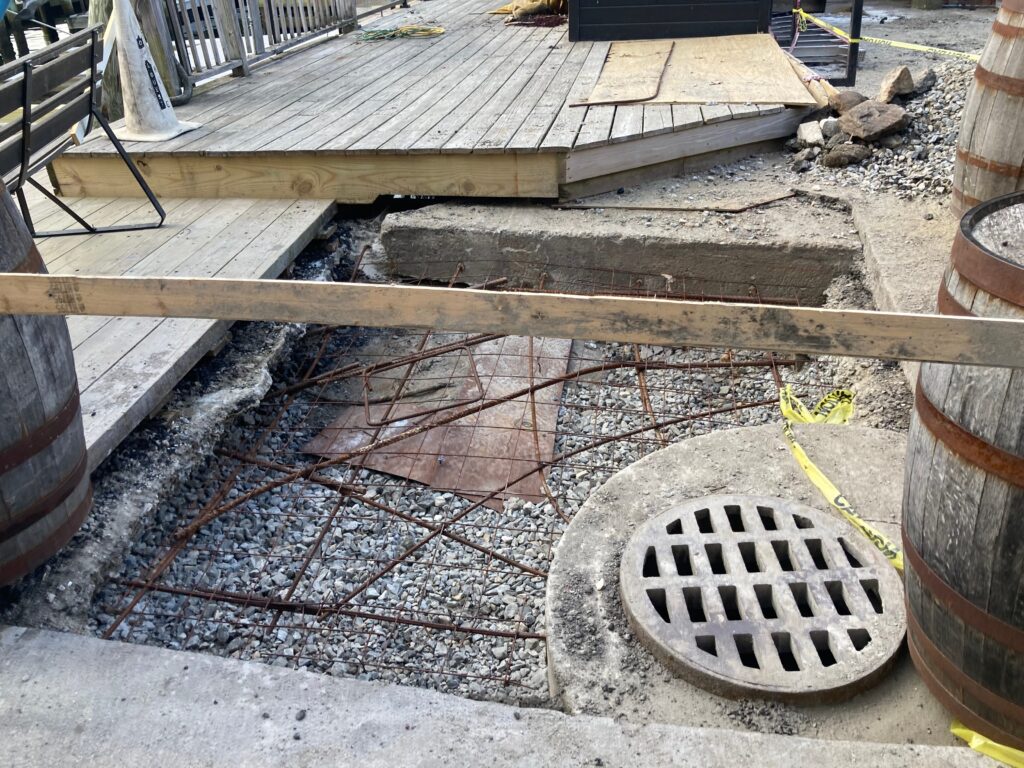
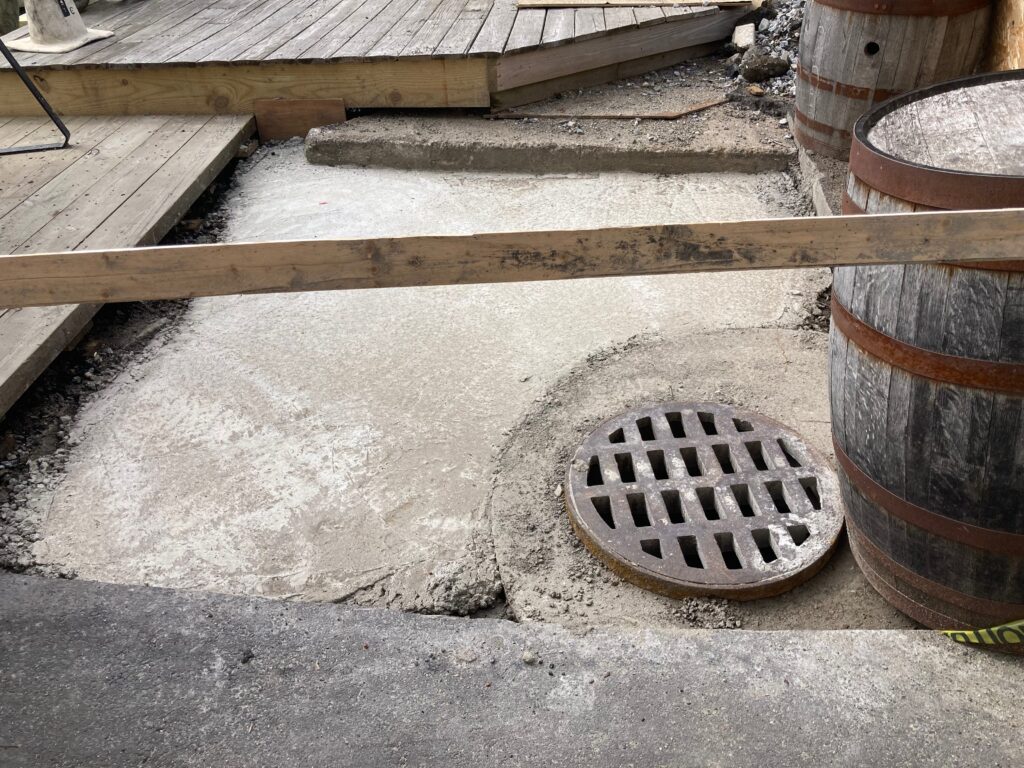
Sea-level rise undermines infrastructure (this sequence on the east side of Peter Ott’s, next to Blaze). Let’s not let the climate crisis undermine community solidarity.
We’re hoping Camden continues to shore up our infrastructure, and at the same time that we, its citizens, work to actively shore-up our community solidarity. Building the latter is not as concrete, literally. Yet it is as critical, perhaps even more so, to our health—on all levels: psychological, financial, and physical.
How do you think we should work toward building Camden’s social resilience? We’d love to hear from you.
The crux of the relationship between environment and mind cuts deeper than I’d ever imagined. Climate change wasn’t only here; it was inside us.
In a jarring paradigm shift, we’re watching a rapidly changing environment directly intervene in our brain health, behavior, cognition, and decision-making in real-time.
—Alder, The Weight of Nature